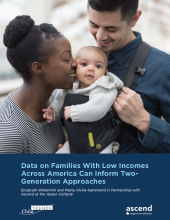0
Report
Community:
Mar 1, 2023

We are delighted to share a new research report in partnership with Child Trends: Data on Families with Low Incomes Across America Can Inform Two-Generation Approaches. In this new analysis, research experts Elizabeth Wildsmith and Marta Alvira-Hammond paint a detailed picture of how families in households with low incomes in the United States have changed since 2011. The report highlights 10 key findings from their analyses of family economic and social conditions related to financial security and mobility, family structure and living arrangements, education and employment, parental health, and community health indicators (for example, rates of child poverty, violent crime, child care costs). A deeper understanding of families with low-incomes will inform our collective work and strengthen how our 2Gen policy and practice recommendations can prioritize health, education, employment, and economic assets to ensure families have access to the resources they need to build intergenerational prosperity and well-being.
Authored by: Elizabeth Wildsmith and Marta Alvira-Hammond for Child Trends in partnership with Ascend at the Aspen Institute
Topics: dual-generation initiative, Early childhood, Education, Health, Housing, Legislation & Policy, Low-income, Racial inequalities
 Shared by Sandra Ware
Shared by Sandra Ware
Sandra Ware posted a
on Mar 2, 2023
Elizabeth Wildsmith and Marta Alvira-Hammond for Child Trends in partnership with Ascend at the Aspen Institute
We are delighted to share a new research report in partnership with Child Trends: Data on Families with Low Incomes Across America Can Inform Two-Generation Approaches.
0
Report
Community:
Feb 17, 2023
The findings from a Syracuse University study linking universal school meal policies with improved school attendance for young students provides a strong case for expanding free school meals, according to school nutrition and attendance experts.
Authored by: Anna Merod for K-12 DIVE
Topics: Attendance, Early childhood, Education, Food insecurity, Health, Legislation & Policy, Low-income, Nutrition, Youth
 Shared by Sandra Ware
Shared by Sandra Ware
Sandra Ware posted a
on Feb 23, 2023
The findings from a Syracuse University study linking universal school meal policies with improved school attendance for young students provides a strong case for expanding free school meals, according to school nutrition and attendance experts.
0
Report
Community:
Apr 11, 2022
Educators play an important role in supporting students' mental well-being. The pandemic has added incredible layers of stress for both adults and young people. Although educators can't control all the stressors and sources of trauma affecting them, they can foster healing and wellness in their classroom or program and work to remove the stigma around mental health concerns.
Authored by: First Book Research & Insights
Topics: Advocacy, Depression, Early childhood, Education, Health, Healthy homes, Literacy, Low-income, Mental health, Racial inequalities, Research, School-readiness, Youth
 Shared by Stephanie Gray
Shared by Stephanie Gray
Stephanie Gray posted a
on Apr 11, 2022
First Book Research & Insights
Educators play an important role in supporting students' mental well-being. The pandemic has added incredible layers of stress for both adults and young people.
0
Report
Community: Youth
Dec 1, 2020
420,000.
Based on the new report, "Lost in the Masked Shuffle & Virtual Void: Children and Youth Experiencing Homelessness Amidst the Pandemic" from SchoolHouse Connection and Poverty Solutions at the University of Michigan, that’s how many fewer children and youth experiencing homelessness have been identified and enrolled by schools so far this school year.
According to our data and insights - gathered from educators and homeless liaisons across 49 states - the number of children, youth, and families experiencing homelessness has likely increased due to the economic crisis. Yet, because of COVID-19 challenges in identifying children and youth experiencing homelessness, hundreds of thousands may not be getting the education and support they need - from internet access, to housing, to food, to child care.
What’s more, only 18% of respondents indicated that federal coronavirus relief education funding provided by the CARES Act is being used to meet the needs of students experiencing homelessness.
To break generational cycles of homelessness, we must take swift action to support the increasing number of children, youth, and families in need. Check out our report to learn more and take action. We have included recommendations for Congressional leaders, state and local educational agencies, homeless, housing, food, and other relief agencies, and philanthropic organizations.
Authored by: Poverty Solutions at THE UNIVERSITY OF MICHIGAN & SCHOOLHOUSE CONNECTION
Topics: Attendance, Child welfare, Early childhood, Education, Funding, Health, Homelessness, Low-income, Stability, Youth
 Shared by Housing Is
Shared by Housing Is
Housing Is posted a
on Dec 1, 2020
Poverty Solutions at THE UNIVERSITY OF MICHIGAN & SCHOOLHOUSE CONNECTION
0
Report
Community:
Jun 6, 2019
Trends in Housing Assistance and Who it Serves
Authored by: PAHRC
Topics: Community development, Disabilities, Education, Funding, Health, Homelessness, Housing, Legislation & Policy, Low-income, Partnerships, Research, Seniors, Workforce development, Youth
 Shared by Keely Stater
Shared by Keely Stater
Keely Stater posted a
on Sep 10, 2019
Trends in Housing Assistance and Who it Serves
0
Report
Community:
Recent research has begun to focus on the impact of housing instability, in its many forms, on child health and development. It is hypothesized that young children are at greater risk of adverse effects of living environments, as this time period serves as a critical window for establishing socialization and learning habits. Additionally, the effects of housing instability may be compounded when combined with other challenges faced by low-income families, such as lack of resources. Previous studies have found that housing instability is associated with deficits in overall academic achievement, emotional regulation, and verbal abilities.
Authored by: International Public Health Journal
Topics: Child welfare, Education, Health, Homelessness, Housing, Research
 Shared by Housing Is
Shared by Housing Is
Housing Is posted a
on May 9, 2019
International Public Health Journal
Recent research has begun to focus on the impact of housing instability, in its many forms, on child health and development.
0
Report
Community:
Jan 7, 2019
When the school day ends, far too many children return home to empty refrigerators and bare cupboards. The federal Afterschool Nutrition Programs provide healthy meals and snacks to children to ensure they are fed after school (and on weekends and during school holidays). According to FRAC’s latest Afterschool Suppers: A Snapshot of Participation report, the District of Columbia had the highest participation in the nation of children in the Afterschool Supper Program, with a 31.6 percent increase in participation between October 2016 and October 2017.
Authored by: Paige Pokorney for Food Research and Action Center (FRAC)
Topics: Child welfare, East Coast, Education, Food insecurity, Health, Low-income, Nutrition, Out-of-school time
 Shared by Housing Is
Shared by Housing Is
Housing Is posted a
on Jan 16, 2019
Paige Pokorney for Food Research and Action Center (FRAC)
When the school day ends, far too many children return home to empty refrigerators and bare cupboards. The federal Afterschool Nutrition Programs provide healthy meals and snacks to children to ensure they are fed after school (and on weekends and during school holidays).
0
Report
Community:
Jan 10, 2019
There isn't federal data on food insecurity among college students nationally, so the GAO reviewed 31 studies on the topic, showing that most concluded that over a third of college students don't always have enough to eat.
Authored by: Elissa Nadworny and Clare Lombardo for NPR
Topics: Education, Food insecurity, Health, Legislation & Policy, Low-income, Nutrition, Post-secondary, Research, Youth
 Shared by Housing Is
Shared by Housing Is
Housing Is posted a
on Jan 16, 2019
Elissa Nadworny and Clare Lombardo for NPR
There isn't federal data on food insecurity among college students nationally, so the GAO reviewed 31 studies on the topic, showing that most concluded that over a third of college students don't always have enough to eat.
0
Report
Community:
Oct 24, 2018
CLPHA’s Housing Is Initiative is engaged in a number of cross-sector activities focused on developing partnerships, facilitating a community of practice, resource development, promoting best practices, online collaboration, policy and advocacy, and training and education. Read about recent activities in this Fall Update.
Authored by:
Topics: Child welfare, CLPHA, Community development, Cost effectiveness, Data sharing, Early childhood, Education, Family engagement, Funding, Health, Homelessness, Housing, Low-income, Medicaid / Medicare, Mental health, Partnerships, Place-based, Post-secondary, Research, Stability, Substance abuse, Workforce development, Youth
 Shared by Mica O'Brien
Shared by Mica O'Brien
Mica O'Brien posted a
on Oct 24, 2018
CLPHA’s Housing Is Initiative is engaged in a number of cross-sector activities focused on developing partnerships, facilitating a community of practice, resource development, promoting best practices, online collaboration, policy and advocacy, and training and education.
0
Report
Community:
Jul 12, 2018
We examined the influence of maternal health literacy on child participation in social welfare programs. In this cohort, 20% of the mothers had inadequate or marginal health literacy. Initially, more than 50% of the families participated in Temporary Assistance for Needy Families (TANF), the Food Stamp Program, and Special Supplemental Nutrition Program for Women, Infants, and Children, whereas fewer than 15% received child care subsidies or public housing. In multivariate regression, TANF participation was more than twice as common among children whose mothers had adequate health literacy compared with children whose mothers had inadequate health literacy
Authored by:
Topics: Child welfare, Dual-generation, Early childhood, Education, Family engagement, Food insecurity, Health, Housing, Low-income, Medicaid / Medicare, Nutrition, Pre-natal, Preventative care, Research, Stability
 Shared by Housing Is
Shared by Housing Is
Housing Is posted a
on Jul 12, 2018
We examined the influence of maternal health literacy on child participation in social welfare programs. In this cohort, 20% of the mothers had inadequate or marginal health literacy.
0
Report
Community:
Nov 1, 2017
Why do some neighborhoods appear able to launch effective local improvement initiatives, while others are more hampered by fragmentation and mistrust? Why can some communities mobilize diverse constituencies to influence public policy, while others cannot? Answers to these questions may be found in the specific patterns of collaboration that form among community organizations, and between these groups, schools, public agencies, and elected officials, according to MDRC, a preeminent social-policy research organization.
Authored by: MDRC
Topics: Asset building, Child welfare, Community development, Data sharing, Dual-generation, Education, Family engagement, Funding, Health, Housing, Legislation & Policy, Low-income, Metrics, Midwest, Mobility, Out-of-school time, Partnerships, Place-based, Preventative care, Research, Safety, Stability, Workforce development, Youth
 Shared by Mica O'Brien
Shared by Mica O'Brien
Mica O'Brien posted a
on Jun 29, 2018
Why do some neighborhoods appear able to launch effective local improvement initiatives, while others are more hampered by fragmentation and mistrust? Why can some communities mobilize diverse constituencies to influence public policy, while others cannot?


 Shared by Sandra Ware
on Mar 2, 2023
Shared by Sandra Ware
on Mar 2, 2023


 Shared by Sandra Ware
on Feb 23, 2023
Shared by Sandra Ware
on Feb 23, 2023

 Shared by Stephanie Gray
on Apr 11, 2022
Shared by Stephanie Gray
on Apr 11, 2022
 Shared by Housing Is
on Dec 1, 2020
Shared by Housing Is
on Dec 1, 2020

 Shared by Keely Stater
on Sep 10, 2019
Shared by Keely Stater
on Sep 10, 2019

 Shared by Housing Is
on May 9, 2019
Shared by Housing Is
on May 9, 2019

 Shared by Housing Is
on Jan 16, 2019
Shared by Housing Is
on Jan 16, 2019


 Shared by Housing Is
on Jan 16, 2019
Shared by Housing Is
on Jan 16, 2019

 Shared by Housing Is
on Jul 12, 2018
Shared by Housing Is
on Jul 12, 2018

